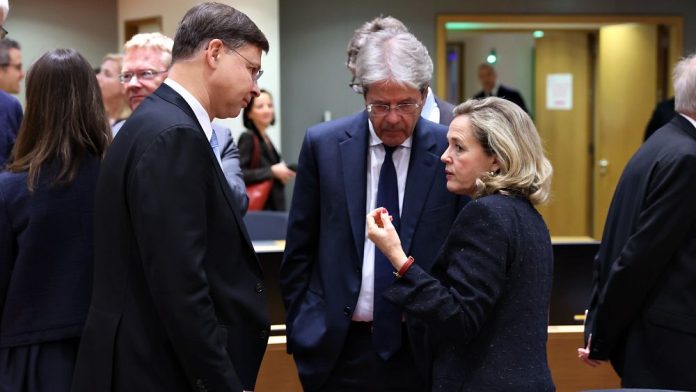EU economy and finance ministers made significant progress on Thursday on changing the bloc’s fiscal rules. However, final push depends on a compromise between France and Germany, Euronews reports.
An extraordinary meeting is scheduled for the end of November. The two capitals have diametrically opposed views in the months-long debate, which must be finalised by the end of the year so that EU member states can develop their budgets according to the new rules. If this does not happen, the old rules, suspended since the start of the COVID-19 pandemic, will come back into force.
The two representatives will discuss the most contentious issues of the budget reform, namely the numerical guarantee an annual reductions in debt and deficit levels. France argues that automatic and uniform rules would be counterproductive and potentially stifle economic growth, which is why it has so far resisted the idea. But Germany is standing firm, backed by a group of member states including the Netherlands, Austria, Sweden and Denmark that want to ensure that public spending is effectively contained.
The latest “landing zone” circulated by Spain, the country holding the rotating presidency of the EU Council, does not clearly state the percentage points of the debt reduction and deficit control mechanisms, suggesting that this will be the last hurdle to overcome. Lindner said on Thursday morning, before heading to the ministerial meeting in Brussels:
“It is progress that the idea of safeguards and benchmarks is acknowledged with regard to the debt-to-GDP ratio and the annual deficit. But what has to be considered is the level of ambition. So now it is about numbers, not only instruments. I’m optimistic but much more work has to be done. We’re in an open debate among partners and friends. It’s not about deadlines or red lines – it’s about horizons.”
Le Maire said the bilateral discussions were going “in the right direction”. He described the Franco-German mood as “very positive and constructive” and emphasised that the result should be “credible” and “solid” fiscal rules that leave the countries enough financial space to invest in high-tech and green transition. Le Maire said:
What is at stake behind those negotiations is the whole credibility of the European Union. Facing economic difficulties (and) geopolitical risks, there is a need to come to an agreement by the end of 2023, we cannot wait (until) 2024 with the perspective of the European elections.
Reforming the Stability and Growth Pact, the fiscal rules that have defined the bloc’s fiscal position since the late 1990s, is now on the agenda. Under current rules, member states must keep budget deficits below 3 per cent of gross domestic product (GDP) and public debt levels below 60 per cent of GDP – thresholds that many governments exceed after years of intensive spending to mitigate the effects of successive crises.
In a legislative proposal presented in April, the European Commission left unchanged the 3% and 60% targets, considered arbitrary and outdated by some economists, but made significant changes to how the two targets are to be met.
Each EU member state will be asked to develop a medium-term fiscal plan to reduce deficits at an acceptable pace and put public debt on a “plausible downward trajectory”. These plans will first be agreed between the European Commission and capitals and then endorsed by the EU Council.
The fiscal adjustments needed to reach 3 per cent and 60 per cent will take four years. They could be extended to seven years in exchange for further reforms and investments.
While the combination of fiscal sustainability and national ownership was welcomed by all, it was not enough to accelerate the negotiations: the capitals have spent the past months haggling over provisions of a purely technical nature, including guarantees of debt reduction.
Spain had initially targeted Thursday’s meeting as the desired date for an agreement on a revised legislative proposal. But after a series of “50 meetings and contacts” with the other 26 member states, the presidency decided instead to offer a “landing pad” to advance discussions. Nadia Calviño, Spain’s acting economy minister, said after the ministerial meeting:
“Today we see there is agreement on the core elements and mechanism of the new fiscal rules.”
According to Calviño, the Spanish EU presidency will translate the working document into a corresponding legal proposal, which will then be discussed by ministers at an extraordinary meeting later this month. Ideally, Calviño noted, the final agreement will be concluded on 8 December, when economy and finance ministers are expected to meet again. Any possible Franco-German compromise would be “integrated” into the work of the presidency. She added:
“Our assessment is that we may need two (more meetings) to finalise and reach an agreement on the legal text.”
The Council’s potential agreement would have to be negotiated with the European Parliament before coming into force in early 2024.
